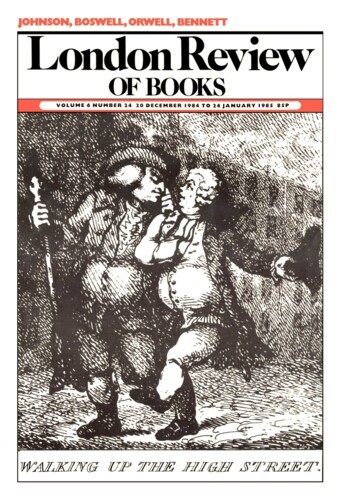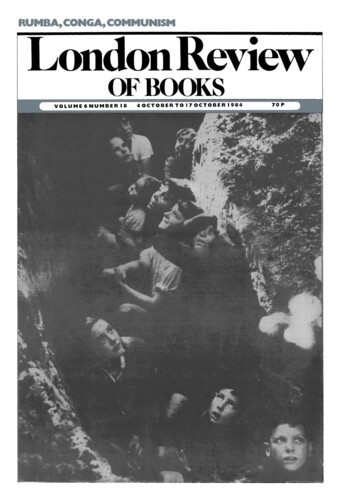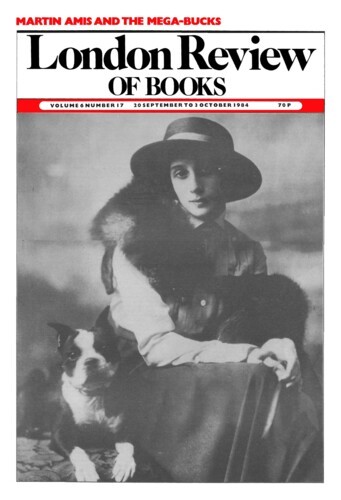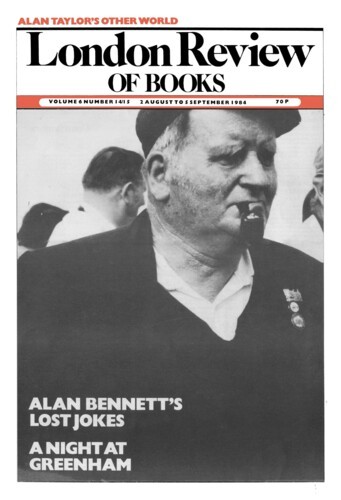Denis Donoghue
Denis Donoghue, who died in 2021, was born in Tullow, County Carlow and studied at University College Dublin, Cambridge and the Royal Academy of Music, where he excelled at Lieder singing. He taught literature at UCD for many years, before being appointed to the Henry James Chair of English and American Letters at New York University in 1980. His many books include editions of W.B. Yeats, Henry James and R.P. Blackmur, a biography of Walter Pater and critical works on subjects including literature and eloquence, voice, interpretation and metaphor. His thirty pieces for the LRB include accounts of W.H. Auden’s lack of seriousness, J.M. Synge’s ‘tedious’ love letters, many reviews of contemporary poetry and an essay on ‘the other place’ (Trinity College Dublin).
Plain English
Denis Donoghue, 20 December 1984
Orwell took little care of his manuscripts. He didn’t anticipate that collectors of such things would pay real money for them, and that universities would think it a privilege to turn a writer’s bits and pieces into an archive. The typescript used in the printing of Nineteen Eighty-Four is in the Orwell Archive at University College London. There are also preliminary drafts of the novel – pages of handwritten and typewritten material, with corrections and additions – which correspond to a little less than half of the published text: 44 per cent, according to Peter Davison’s estimate. These have now been published in an opulent edition: the right-hand pages of the book give a full-size photograph of the material, the left-hand pages contain Professor Davison’s transcription, laboriously deciphered, the cancellings in nearly every case recovered. Orwell’s typescript is given in roman, his manuscript in italic script. The book is far too big to be held in the hand; it is for consultation on a large desk, the pages to be turned with due appreciation of the craft of editor and printer. The work of printing and binding was done in Italy by Imago Publishing Ltd, Thame.’
Making sense
Denis Donoghue, 4 October 1984
In ‘A Wave’, the title-poem of his new collection, John Ashbery says, among many other things:
Denis Donoghue examines the new edition of ‘Ulysses’
Denis Donoghue, 20 September 1984
Joyce’s Ulysses was published on his 40th birthday, 2 February 1922, in a limited edition of 1000 numbered copies. The text was full of misprints, as Joyce irritatedly knew. As late as November, he had been tinkering with the last chapters, getting further detail from Dublin – ‘Is it possible for an ordinary person to climb over the area railings of No 7 Eccles Street, either from the path or the steps, lower himself down from the lowest part of the railings till his feet are within 2 feet or 3 of the ground and drop unhurt?’ he wrote to his Aunt Josephine – and the galleys were demanding attention he couldn’t give them. On 6 November he complained to Harriet Shaw Weaver that ‘working as I do amid piles of notes at a table in a hotel I cannot possibly do this mechanical part with my wretched eye and a half.’ He evidently decided that he couldn’t do much about the printer’s errors in time for the birthday, but he hoped they would be corrected ‘in future editions’.
Morgan to his Friends
Denis Donoghue, 2 August 1984
On 10 February 1915 E.M. Forster visited D.H. and Frieda Lawrence at Greatham. The visit went off reasonably well, by the standards appropriate to those participants. The men, according to Forster, ‘had a two hours walk in the glorious country’ between Greatham and Arundel. Lawrence told Forster ‘all about his people – drunken father, sister who married a tailor, etc: most gay and friendly, with breaks to look at birds, catkins, etc. Last night we painted pill boxes … ’ and an editorial note explains that these were bee boxes, used for transporting live bees. But the conversation was evidently more searching than Forster’s account suggests. Nearly seven years later, Lawrence writing from Taos assured Forster that ‘Yes, I think of you – of your saying to me, on top of the downs in Sussex – “How do you know I’m not dead?” ’–
Pieces about Denis Donoghue in the LRB
What is a pikestaff? Metaphor
Colin Burrow, 23 April 2015
Metaphors. The little devils just wriggle in everywhere. ‘Put a lid on it,’ ‘get stuck in,’ ‘shut your trap’: they’re a routine feature of vernacular...
The Devilish God: T.S. Eliot
David Wheatley, 1 November 2001
Few presences were more imposing in postwar poetry than that of T.S. Eliot, but from his eminence as the Pope of Russell Square, Eliot has now shrunk to something more like a holy ghost....
Provocation
Adam Phillips, 24 August 1995
In a contemporary review of The Renaissance in the Pall Mall Gazette, the critic Sidney Colvin wrote that ‘the book is not one for any beginner to turn to in search of...
Literary Supplements
Karl Miller, 21 March 1991
Denis Donoghue has written a seductive book. Perhaps it could be said that he has spliced together two books, one of which is more seductive than the other. One of them narrates. The other...
Green War
Patricia Craig, 19 February 1987
Wars and battles: these words, appearing prominently in the titles of two of the books under consideration, might give the impression that poetry, or criticism, or the criticism of poetry, is a...
Epireading
Claude Rawson, 4 March 1982
Denis Donoghue begins, a little self-indulgently, by reprinting six short BBC talks on ‘Words’. The excuse is that such radio talks offer a simple if incomplete model for...
Read anywhere with the London Review of Books app, available now from the App Store for Apple devices, Google Play for Android devices and Amazon for your Kindle Fire.
Sign up to our newsletter
For highlights from the latest issue, our archive and the blog, as well as news, events and exclusive promotions.




